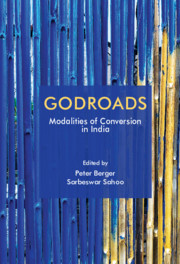Book contents
- Frontmatter
- Contents
- Foreword
- Acknowledgements
- Introduction
- 1 The Rise, Growth and Significance of Shudra Conversion Movements in the Methodist Mission, Hyderabad, 1925–1947
- 2 Communism and the Cross: A Caste–Class Trajectory of Religious Conversion in South India
- 3 Religious Conversion as Ethical Transformation: A Study of Islamic Reformism in Rural West Bengal
- 4 Conversion versus Unity: The Basel Mission among the Badaga on the Nilgiri Plateau, 1845–1915
- 5 Identity Change and the Construction of Difference: Colonial and Postcolonial Conversions among the Sumi Naga of Nagaland, Northeast India
- 6 Conversion to Christianity and Healing: The Naga of Northeast India
- 7 Reshaping the American Evangelical Conversion Narrative in Nineteenth-Century North India
- 8 Cultural Transformations through Performance Arts in Early Twentieth-Century South India
- 9 Reservation and Religious Freedom: Understanding Conversion and Hindu–Christian Conflict in Odisha and Rajasthan
- 10 Rupture and Resilience: Dynamics between a Hindu Reform Movement and an Indigenous Religion in Highland Odisha
- Afterword: India Seen from Amazonia
- About the Contributors
- Index
9 - Reservation and Religious Freedom: Understanding Conversion and Hindu–Christian Conflict in Odisha and Rajasthan
Published online by Cambridge University Press: 24 April 2020
- Frontmatter
- Contents
- Foreword
- Acknowledgements
- Introduction
- 1 The Rise, Growth and Significance of Shudra Conversion Movements in the Methodist Mission, Hyderabad, 1925–1947
- 2 Communism and the Cross: A Caste–Class Trajectory of Religious Conversion in South India
- 3 Religious Conversion as Ethical Transformation: A Study of Islamic Reformism in Rural West Bengal
- 4 Conversion versus Unity: The Basel Mission among the Badaga on the Nilgiri Plateau, 1845–1915
- 5 Identity Change and the Construction of Difference: Colonial and Postcolonial Conversions among the Sumi Naga of Nagaland, Northeast India
- 6 Conversion to Christianity and Healing: The Naga of Northeast India
- 7 Reshaping the American Evangelical Conversion Narrative in Nineteenth-Century North India
- 8 Cultural Transformations through Performance Arts in Early Twentieth-Century South India
- 9 Reservation and Religious Freedom: Understanding Conversion and Hindu–Christian Conflict in Odisha and Rajasthan
- 10 Rupture and Resilience: Dynamics between a Hindu Reform Movement and an Indigenous Religion in Highland Odisha
- Afterword: India Seen from Amazonia
- About the Contributors
- Index
Summary
This chapter seeks to analyse the increasing incidents of Hindu–Christian conflict in India. ‘While Hindu–Muslim violence has been extensively analysed, Hindu–Christian violence was until recently so rare that scholars have seldom investigated the phenomenon’ (Bauman and Leech 2012: 2195). In Ethnic Conflict and Civic Life, Ashutosh Varshney (2002) argues that Hindu–Muslim conflict has been the ‘master narrative’ of postcolonial Indian political history. Besides the Partition violence, which killed 6,00,000 to 1 million people (Frankel 2000: 6), data shows that more than 1,100 cases of Hindu–Muslim conflict have occurred in India between 1950 and 1995, resulting in around 7,000 deaths (Chaudhuri 2015: 2). Though there are disagreements among historians on the causes and origins of Hindu–Muslim antagonism, scholars of secular, modern historiography of India have particularly held the British colonial state and its ‘divide and rule’ policy responsible for conflict between Hindus and Muslims.
Compared to Hindu–Muslim conflicts, Hindu–Christian conflict in colonial India was very small scale. Some possible reasons are: First, the percentage of Christian population was extremely small. According to data, Christians constituted a mere 0.71 per cent in 1881. Although their number increased, they still remained below 1 per cent (0.98 per cent) by 1901 (Joshi, Srinivas and Bajaj 2005: 9). Second, the Christian population was mostly confined to certain regions of the country. So, when some conflicts occurred between Hindus and Christians, they were small scale and largely confined to a particular locality. Finally, Christian missionaries did not receive open support of the colonial state.
The relationship between the colonial state and the missionaries was ambiguous. Colonial administrators like Lord William Bentinck, as Governor of Madras, actively encouraged missionaries to carry out their work of converting Hindus. Similarly, Lord Macaulay supported Christian missionaries as he believed that they could play an important role in imparting English education to Indians, which would not only produce loyal colonial subjects but would strengthen the roots of British Empire in India. He famously noted: ‘[W]e must do our best to form a class who may be interpreters between us and the millions whom we govern; a class of persons, Indians in blood and colour, but English in taste, in opinions, in morals and in intellect’ (cited in Tharoor 2017).
- Type
- Chapter
- Information
- GodroadsModalities of Conversion in India, pp. 222 - 245Publisher: Cambridge University PressPrint publication year: 2020



